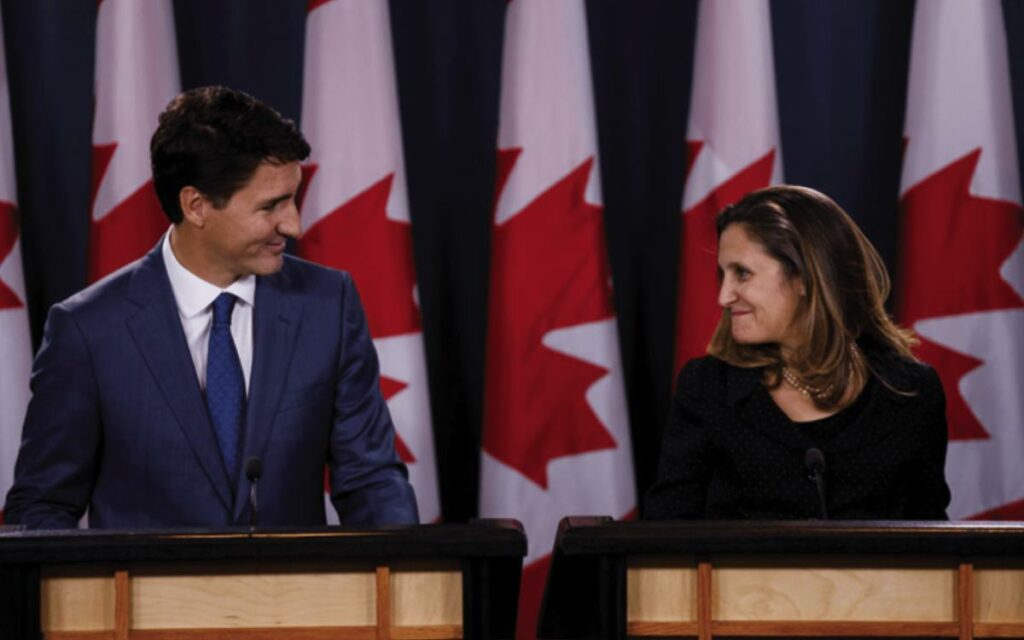
Thanks in no small part to the polices of the current government, led by Prime Minister Justin Trudeau and Finance Minister Chrystia Freeland, all is not well on Canada’s economic front. Photo credit: PMO/Adam Scotti
Now eight years into his tenure as Prime Minister, it has become abundantly clear that Justin Trudeau’s promise of “sunny days” has failed to materialize. An ever-growing number of Canadians are financially strained and finding themselves caught in impossible living situations. There are numerous economic reports and studies suggesting matters will worsen in this country – and Canadians will not be waking anytime soon from this midsummer night’s nightmare.
Nik Nanos of Nanos Research recently completed a deep data dive for the Globe and Mail into Canadians’ feelings about their future well-being. He found we harbour grave concerns. Nanos reports that Canucks are “more pessimistic about their future standard of living than they have been in more than a decade.” He assessed, “Many Canadians, and especially young people, are struggling to pay for housing and basic necessities… The unspoken truth is that the pandemic will have a long-term impact on the behaviour of people.”
Today, 65 per cent of Canadians feel that the next generation will have a lower standard of living than what we have now. Only 10 per cent feel living standards will improve, which is a huge drop in optimism from 26 per cent who felt positive about their future only a decade ago. When future historians look back at Canadians living through the 2020s, Nanos suggests they will refer to “a scarred generation” where “lives were disrupted, personal values were challenged, and what emerged was a hard-nosed questioning of self and society.”
This rather dismal gut-feel of Canadians’ fortunes is supported in the findings of the Organization for Economic Co-operation and Development (OECD), which recently conducted an in depth statistical review of its member counties. The OECD has projected that growth in living standards in Canada will rank 38th of the 38 developed member-countries over the next 40 years. We are expected to do the worst of all countries. The primary reason for this gloomy projection is that, during the 2020-21 pandemic year, Canada outspent all countries in the world to post an overall debt burden equivalent to 352 per cent of its GDP.
The Trudeau government not only outspent all countries with is pandemic spending, it has more than doubled the debt load of the country, and Canadians now are burdened with over one trillion dollars of federal debt. A new CD Howe Institute report calculated federal spending jumped in the 2020-21 fiscal year by more than 70 per cent. The report reveals this massive spending occurred with no financial controls, little accountability and oversight, and a lack of transparency of the public accounts. The Institute suggests, with the accumulated deficit spending and current debt load, the federal government may well have impaired its capacity to deliver basic services in the future.
Commenting on the hundreds of billions of dollars spent by the Trudeau government during the pandemic, Bill Robson, chief executive at CD Howe states, “The decisions that got made that are going to affect our future for years and decades to come, were really made on the fly without appropriate deliberation. We need more transparency from our governments about how they’re spending our money, especially when something like COVID happens.”
In a Financial Post interview Robson observed that most Canadians are unaware of the scale of the debt governments amassed and the fact that present and future working-Canadians will be required to pay for servicing this debt for years to come. Robson said, “It’s a bit unsettling that so many questions just never got answered … The information is so patchy…. We have a few lean years ahead.”
For the record, in 2022-23, Canadians paid an unprecedented $34.7 billion on interest charges to service the federal debt. With interest rates rising, this figure is expected to rise accordingly.
Two recent economic reports reveal that Canada is now an outlier among advanced economies around the world. Unlike all its comparable national economies, Canada has yet to rebound to its pre-pandemic standard of living as measured by real gross domestic product (GDP) per capita. Most disturbing is the TD Economic forecast that predicts the Canadian economy will continue to shrink through 2024.
The OECD factors that Canada will be a laggard in real GDP per capita growth through the next 35 years, until 2060. Major factors for our lackluster economic performance is a waning business confidence, and decreasing domestic and foreign investment in Canadian businesses and projects.
TD economist Marc Ercolao explained in a recent interview with Financial Post: “Over the last 20 years, Canadian R&D investment has been in perpetual decline, while all other G7 countries have seen increases to varying degrees.” In Canada, this has created a serious “innovation gap” with the country falling behind the rest of the advanced world. So, as Ercolao sees it, the prospects are not promising: “Unfortunately, for Canadians, little turnaround in Canadian living standards appears to be on the horizon.”
In an editorial comment on the financial pages of the Globe and Mail, economists Jake Fuss and Tegan Hill at the Fraser Institute echo the TD outlook and commented, “Despite any claims by Minister Freeland and the Trudeau government, Canada faces serious and long-term economic challenges. The government’s policies have sought to grow the country’s economy almost exclusively by boosting the population and increasing the role of government, but this plan has failed to deliver prosperity for Canadians.”
For Fuss and Hill, the Trudeau government has compounded a difficult situation and has caused a “worrying” stagnation in living standards for Canadians. “Without a change in economic strategy, Canada is destined for more calamity in the coming decades,” they concluded.
Still, denying the facts and stats, the Trudeau government maintains its “sunny days” narrative. A lead editorial in the Globe and Mail entitled “The economy according to Justin Trudeau” calls out the PM on his rhetoric. It concluded, “Mr. Trudeau, understandably one supposes, would rather dwell on the largely mythical shortcomings of the Harper government than face the fact that his economic program has been in fact a formula for declining prosperity – the very sin for which he wrongly excoriates his predecessor.”
So, by all accounts, Canadians are in for a very rough ride for years – and the younger generations may never experience the standard of living the boomer generation enjoyed while working and raising their families in Canada. No bromides from PM Justin Trudeau or Finance Minister Chrystia Freeland will be able to whistle pass this sad reality.

Chris George is an advocate, government relations advisor, and writer/copy editor. As president of a public relations firm established in 1994, Chris provides discreet counsel, tactical advice and management skills to CEOs/Presidents, Boards of Directors and senior executive teams in executing public and government relations campaigns and managing issues. Prior to this PR/GR career, Chris spent seven years on Parliament Hill on staffs of Cabinet Ministers and MPs. He has served in senior campaign positions for electoral and advocacy campaigns at every level of government. Today, Chris resides in Almonte, Ontario where he and his wife manage www.cgacommunications.com. Contact Chris at chrisg.george@gmail.com.




















